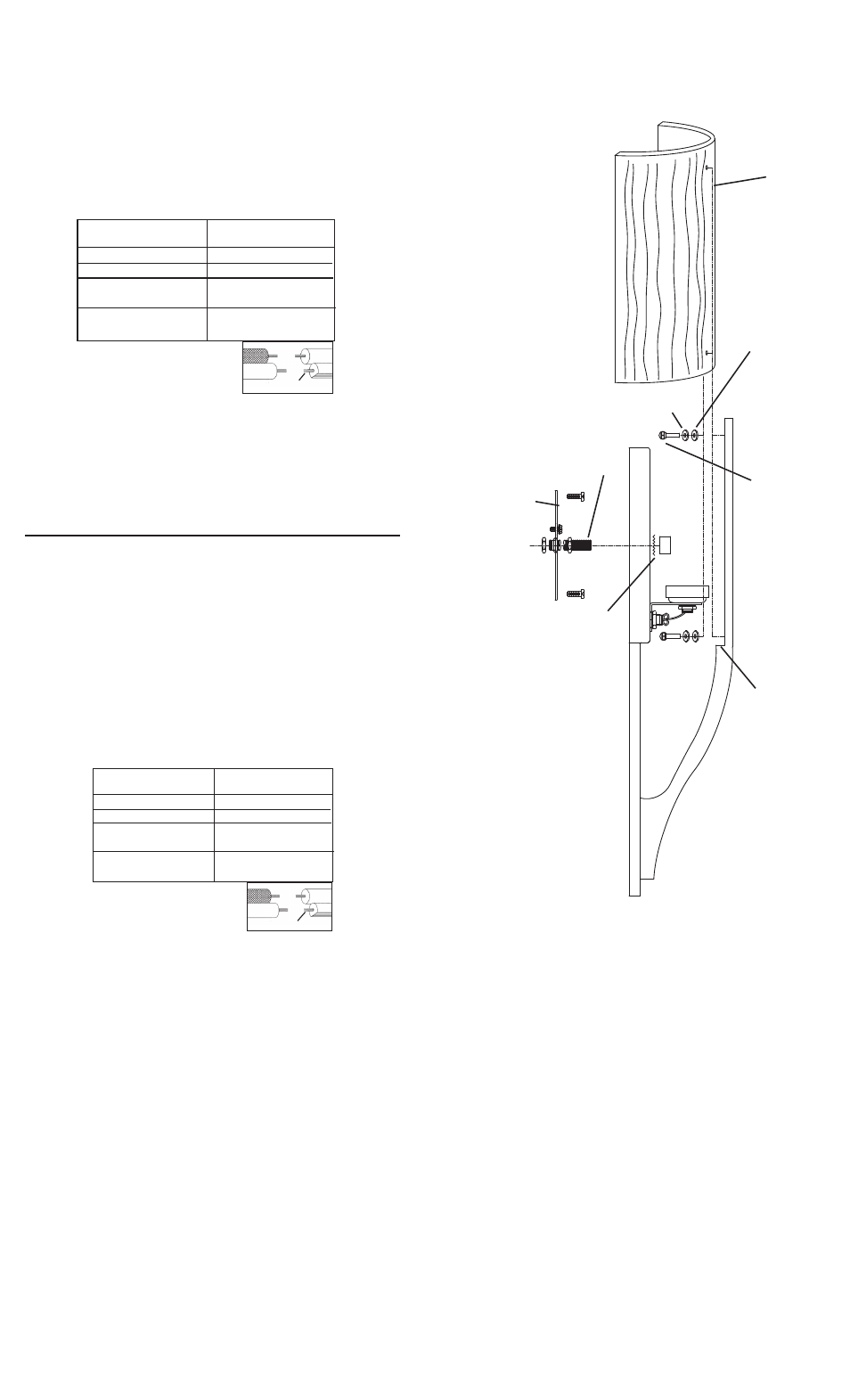Kichler 10686 Manuel d'utilisation
Luminaires Kichler

1) Turn off power.
IMPORTANT: Before you start, neVer attempt any work without
shutting off the electricity until the work is done.
a)
Go to the main fuse, or circuit breaker, box in your home. place
the main power switch in the “off” position.
b)
unscrew the fuse(s), or switch “off” the circuit breaker switch(s),
that control the power to the fixture or room that you are working on.
c)
place the wall switch in the “off” position. If the fixture to be
replaced has a switch or pull chain, place those in the “off” position.
2) Attach mounting strap to outlet box. (Screws not provided)
3) Thread hexnut onto threaded pipe so that 5 threads are exposed above
hexnut. Thread that end of threaded pipe into mounting strap and
tighten hexnut against mounting strap.
4) Make wire connections (connectors not provided.) reference chart
below for correct connections and wire accordingly.
5) push fixture to wall, carefully passing threaded pipe through hole.
6) Secure fixture to wall using threaded cap.
7) place glass behind metal bar allowing glass to sit on step. Align holes in
glass with holes in bar.
8) place one flat washer then one rubber washer over end of ball stud.
9) from inside glass, thread ball stud into hole in glass and into bar.
Tighten ball stud to secure glass in place. (Do noT over tighten.)
10) repeat steps #9 and 10 for remaining ball stud.
11) Insert recommended bulb.
1) Couper le CourAnT.
IMPORTANT: TouJourS couper l’électricité avant de commencer le
travail.
a)
localiser le coffret à fusibles ou le disjoncteur du domicile. Mettre
l’interrupteur principal en position d’Arrêt.
b)
Dévisser le ou les fusibles (ou mettre le disjoncteur sur Arrêt) qui
contrôlent l’alimentation vers le luminaire ou la pièce dans
laquelle le travail est effectué.
c)
Mettre l’interrupteur mural en position d’Arrêt. Si le luminaire à
remplacer est doté d’un interrupteur ou d’une chaîne connectée à
l‘interrupteur, placer ces éléments en position d’Arrêt.
2) Visser le collier de fixaiton à la boîte de jonction (vis non fournies).
3) Visser l’écrou hexagonal sur le tube fileté de façon a laisser cinq fils a
découvert au-dessus de l’ecrou. enfiler cette extrémite du tube filete \
dans le collier de faxation et serrer l’ecrou contre le colllier de fixation.
4) Connecter les fils (connecteurs non fournis). Se reporter au tableau ci-
dessous pour faire les connexions.
5) pousser l’applique contre le mur, et faire passer les vis de fixaiton dans
les trous de passage en procédant avec précautions.
6) fixer l’applique contre le mur à l’aide des rondelles freins et du bouchon
filete.
7) placer le verre derrière la barre de métal permettant au verre de
reposer sur la marche. Aligner les trous dans le verre avec les trous
dans la barre.
8) placer une rondelle plate suivie d’une rondelle de caoutchouc à
l’extrémité du pivot à rotule.
9) De l’intérieur du verre, enfiler le pivot à rotule dans le verre jusque dans
la barre. Serrer le pivot à rotule afin de fixer le verre en place. (ne pAS
trop serrer.)
10) répéter les étapes 9) et 10) pour le pivot à rotule restant.
11) Introduire l’ampoule recommandée.
Connect Black or
Red Supply Wire to:
Connect
White Supply Wire to:
Black
White
*Parallel cord (round & smooth)
*Parallel cord (square & ridged)
Clear, Brown, Gold or Black
without tracer
Clear, Brown, Gold or Black
with tracer
Insulated wire (other than green)
with copper conductor
Insulated wire (other than green)
with silver conductor
*Note: When parallel wires (SPT I & SPT II)
are used. The neutral wire is square shaped
or ridged and the other wire will be round in
shape or smooth (see illus.)
Neutral Wire
Date Issued: 6/18/10
IS-10686-CB
INSTRUCTIONS
For Assembling and Installing Fixtures in Canada
Pour L’assemblage et L’installation Au Canada
THreADeD CAp
BouCHon fIleTe
THreADeD pIpe
TuBe fIleTé
MounTInG STrAp
ColllIer De fIxATIon
Connecter le fil noir ou
rouge de la boite
Connecter le fil blanc de la boîte
A Noir
A Blanc
*Au cordon parallèle (rond et lisse)
*Au cordon parallele (à angles droits el strié)
Au bransparent, doré, marron, ou
noir sans fil distinctif
Au transparent, doré, marron, ou
noir avec un til distinctif
Fil isolé (sauf fil vert) avec
conducteur en cuivre
Fil isolé (sauf fil vert) avec
conducteur en argent
*Remarque: Avec emploi d’un fil paralléle
(SPT I et SPT II). Le fil neutre est á angles
droits ou strié et l’autre fil doit étre rond ou
lisse (Voir le schéma).
Fil Neutre
GlASS
Verre
flAT wASHer
ronDelle plATe
ruBBer wASHer
ronDelle De
CAouTCHouC
BAll STuD
pIVoT à
roTule
STep
MArCHe